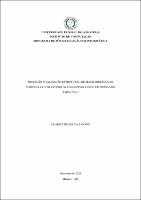| ???jsp.display-item.social.title??? |


|
Please use this identifier to cite or link to this item:
https://tede.ufam.edu.br/handle/tede/9454| ???metadata.dc.type???: | Dissertação |
| Title: | Predição e validação estrutural de macromoléculas complexas com estudo de caso envolvendo proteínas do Sars-Cov-2 |
| Other Titles: | Structural prediction and validation strategies of SARS-CoV-2 macromolecues Prediction and structural validation of complex macromolecules with case study involving SARS-CoV-2 proteins |
| ???metadata.dc.creator???: | Santos, Clarice de Souza  |
| ???metadata.dc.contributor.advisor1???: | Rodrigues, Rosiane de Freitas |
| First advisor-co: | Oliveira, Kelson Mota Teixeira de |
| ???metadata.dc.contributor.referee1???: | Silva, Jonathas Nunes da |
| ???metadata.dc.contributor.referee2???: | Colonna, Juan Gabriel |
| ???metadata.dc.description.resumo???: | A estrutura tridimencional de uma proteína é importante devido a função da proteína estar ligada tanto a sua composição atômica quanto a sua estrutura tridimensional e no caso de um vírus a predição de maneira mais rápida e simples agiliza a criação de vacinas e remédios para combatê-lo. Esta dissertação apresenta aspectos matemático-computacionais e físico-químicos envolvidos na reconstrução da estrutura de proteínas, usando como estudo de caso proteínas do vírus SARS-CoV-2. Para isto, foram implementados os principais algoritmos que resolvem o problema (Molecular Distance Geometry Problem - MDGP), propostas e testadas variações de um dos algoritmos e realizada uma visita técnica ao Centro Nacional de Ressonância Magnética Nuclear da UFRJ, onde foi possível analisar o método de obtenção de dados através da Ressonância Magnética Nuclear. Após análise dos métodos implementados, foi identificada a necessidade de uma validação química para as estruturas geradas, uma vez que o cálculo estrutural somente garante a validade matemática dos resultados, então foi criada uma metodologia de reconstrução estrutural que vai desde a busca de dados, criação de instâncias de teste até o cálculo e validação estrutural. Essa metodologia foi utilizada no estudo de caso realizado com proteínas do novo coronavírus, principalmente nas variantes que atingiram o estado do Amazonas. |
| Abstract: | The three-dimensional structure of a protein is important because the function of the protein is linked to both its atomic composition and its three-dimensional structure, and in the case of a virus, prediction in a faster and simpler way speeds up the creation of vaccines and medicines to fight it . This dissertation presents mathematical-computational and physical-chemical aspects involved in the reconstruction of the three-dimensional molecular structure of proteins, using proteins from the SARS-CoV-2 virus as a case study. For this, the main algorithms that solve the Molecular Distance Geometry Problem (MDGP) were implemented, variations of one of the algorithms were proposed and tested, and a technical visit to the National Center for Nuclear Magnetic Resonance at UFRJ was carried out, where it was possible to analyze the method of obtaining data through Nuclear Magnetic Resonance. After analyzing the implemented methods, the need for chemical validation for the generated structures was identified, since the structural calculation only guarantees the mathematical validity of the results, so a structural reconstruction methodology was created, ranging from data search, creation from test instances to calculation and structural validation. This methodology was used in the case study carried out with proteins of the new coronavirus, mainly in the variants that reached the state of Amazonas. |
| Keywords: | COVID-19 (Doença) - Testes COVID-19 (Doença) - Análise |
| ???metadata.dc.subject.cnpq???: | CIENCIAS EXATAS E DA TERRA: CIENCIA DA COMPUTACAO CIENCIAS BIOLOGICAS: BIOQUIMICA: QUIMICA DE MACROMOLECULAS |
| ???metadata.dc.subject.user???: | Algoritmos Branch-and-Prune Geometria de distâncias Gráfico de Ramachandran Modelagem molecular |
| Language: | por |
| ???metadata.dc.publisher.country???: | Brasil |
| Publisher: | Universidade Federal do Amazonas |
| ???metadata.dc.publisher.initials???: | UFAM |
| ???metadata.dc.publisher.department???: | Instituto de Computação |
| ???metadata.dc.publisher.program???: | Programa de Pós-graduação em Informática |
| Citation: | SANTOS, Clarice de Souza. Predição e validação estrutural de macromoléculas complexas com estudo de caso envolvendo proteínas do Sars-Cov-2. 2021. 111 f. Dissertação (Mestrado em Informática) - Instituto da Computação, Universidade Federal do Amazonas, Manaus (AM), 2021. |
| ???metadata.dc.rights???: | Acesso Aberto |
| URI: | https://tede.ufam.edu.br/handle/tede/9454 |
| Issue Date: | 30-Dec-2021 |
| Appears in Collections: | Mestrado em Informática |
Files in This Item:
| File | Description | Size | Format | |
|---|---|---|---|---|
| Dissertacao_ClariceSantos_PPGI.pdf | 17.26 MB | Adobe PDF |  Download/Open Preview |
Items in DSpace are protected by copyright, with all rights reserved, unless otherwise indicated.




